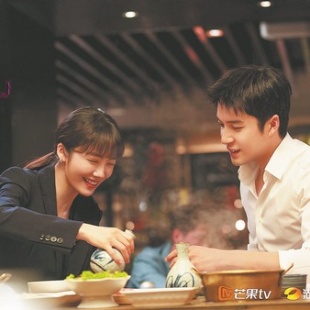Drama unmasks modern relationships


A recently aired drama series that tells a modern love story set against the backdrop of a vibrant metropolis, has become increasingly popular. Its narrative follows a pair of individuals working in Beijing's bustling Central Business District, who are used to skillfully donning different masks to deal with various social situations, but who ultimately choose to show their true selves to each other and fall in love. It has gained a score of 8.3 out of 10 on the review site Douban.
In the drama, Fake It Till You Make It, the male lead, Xu Ziquan, played by actor Han Dongjun, is an investment banker who handles social interactions with ease. The female lead, Tang Ying, portrayed by actress Cai Wenjing, is an ambitious lawyer. Both urban elites excel at presenting themselves with elegance and sophistication.
The story shows their progression from mutual exploration and flirtatious banter, to establishing trust and providing each other with emotional support, before ultimately revealing their authentic selves and falling in love.
Cai says she believes that the characters in the series, adopting different facades and personas, is a stage that everyone experiences in life.
"Pretending to be someone else has a positive aspect, too, because it's often about trying to enhance one's image, or beautify oneself in some way. Perhaps, everyone wants to present an image that matches how they want to be perceived by others," she adds.
The production crew of the series met and interacted with the audience at a screening event held recently at Peking University. The drama provoked much discussion among the audience.
For example, the term "fish", has taken on a new and intriguing meaning on Chinese social media in recent years.
It is now commonly employed in slang terms such as "fish-farming "and "fishpond."
"Fish-farming" denotes the practice of individuals maintaining a number of ambiguous relationships with multiple people, while refraining from entering into genuine romantic partnerships. Meanwhile, "fishpond" refers to the collective pool of individuals with whom one engages in these vaguely defined relationships.
The popularity of such slang terms sheds light on the prevalence among young professionals to lack transparency, or to fear it, when building intimate relationships.
While young love is often characterized by fleeting moments, the criteria for adults when selecting a partner are often laden with numerous considerations, which may include societal norms, family backgrounds, and future prospects.
For mature men and women, love can take on the appearance of an economic equation: Does the investment align with the returns under the condition of mutual attraction? Do both parties offer enduring value? In a fast-paced urban lifestyle, where people often don different personalities to match different situations, expressing genuine emotions and embarking on a long-term romantic relationship is considered a luxury by many.
Li Mo, director of the drama, holds that during the process of personal growth, individuals often need to adapt by wearing different masks in different situations.
Sometimes, they may even compromise their true selves, doing things that go against their innermost feelings. This drama explores how the main characters, amid the hustle and bustle of city life and the complexities of love, gradually find inner peace, rediscover their authentic selves, and learn to live in alignment with their true natures.
"The fear of opening up one's heart, only to be eventually deceived and betrayed, leading to emotional pain, is a common experience among city dwellers," says Li.
"It often takes shared experiences and time to truly discern whether a person is sincere or not. It's only after they've removed all pretense that you can see if you can still accept them for who they are. If you can find someone willing to talk about their true self in front of you, I believe that might be close to what love really is," he adds.
xingwen@chinadaily.com.cn





































